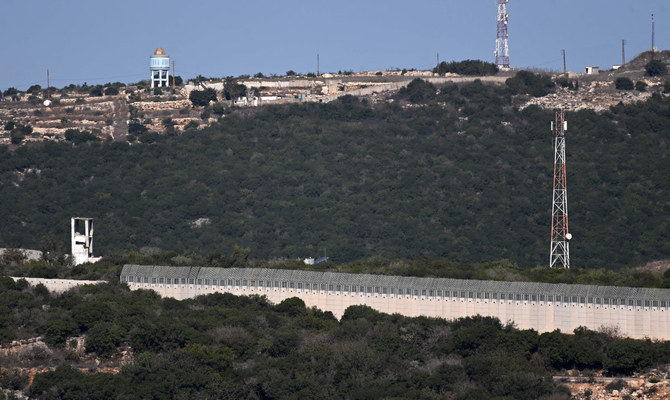BEIRUT: Clashes between Hezbollah and the Israeli army in recent days have caused widespread damage to civilian properties in Lebanon’s border area, with hospitals in the capital and southern region finalizing emergency plans in case of war.
Israeli bombardment on Friday evening and Saturday damaged many houses in border towns, as well as power grids.
Sirens were sounded more than once in many Israeli settlements along the Blue Line after they were evacuated, according to Israeli media.
Explosions were heard in Tyre and Bint Jbeil, after Israel’s Iron Dome defense system intercepted guided rockets launched from Lebanon.
Heavy Israeli shelling mainly targeted the Shebaa Farms area on Saturday afternoon.
Photos on social media showed the magnitude of the destruction to the house of the mayor of the Rab Al-Thalathine border village. Footage also revealed the extent of damage to the electricity grid in the Burj Al-Moulouk town.
Andrea Tenenti, spokesperson for the UN forces in Lebanon, said that UNIFIL “remains fully committed to their mission represented by restoring stability in southern Lebanon, and are doing their utmost to prevent the escalation of hostilities.”
Tenenti said that the head of mission and force commander, Maj. Gen. Aroldo Lazaro, is inspecting the operational region to assess the situation and listen to peacekeepers’ concerns.
Analysts warn that tit-for-tat escalation along the border could develop into a war between Israel and Hezbollah in Lebanon, prompting hospitals in Beirut and the south to implement a precautionary emergency plan under the direction of the Ministry of Health.
A Beirut hospital official told Arab News that her site has “completed its plan and we have opened a special route for ambulances transporting the wounded.”
She added: “We have allocated zones of different colors to receive the wounded depending on the severity of their case. We have also secured human, logistical and pharmaceutical staff.”
People are fleeing towns adjacent to the Blue Line toward safer regions.
Meanwhile, all educational institutions in the country remain closed until further notice.
In Tyre — a southern city 22 km away from the border region of Ras Al-Naqoura — more than 1,500 Lebanese and Syrian families are believed to be scattered across accommodation centers set up inside schools.
Hundreds of Lebanese families have chosen to move to other regions in Chouf, Mount Lebanon, Metn and Beirut.
In July 2006, a war between Israel and Hezbollah broke out, killing more than 1,200 Lebanese and injuring 4,400, mostly civilians. On the Israeli side, the war claimed the lives of 160 people, mostly soldiers. The 30-day conflict prompted about 1 million Lebanese to flee their towns and caused unprecedented material damage, especially to Dahieh, known as the “southern suburb” of Beirut.
Walid Jumblatt, former leader of the Progressive Socialist Party, voiced concerns that “Lebanon may not be able to escape the possibility of a widening circle of war.”
Jumblatt said he was working with the head of the Progressive Socialist Party, his son Taymour Jumblatt, to “make the necessary logistical efforts to accommodate those displaced from areas that could be targeted in the event of an Israeli attack.”
He added: “The Druze-dominated villages of the mountain will be open to everyone, Shiite or Sunni or Christian.”
The Lebanese public are divided over whether the country should be dragged into the Israel-Hamas conflict. Some categorically refuse to be involved in a war where their chances of victory are slim, while others support the Palestinian cause and argue for their country to enter the conflict.
Due to the economic crisis Lebanon has grappled with since 2019, displaced people are struggling to make ends meet.
Rabab, a resident of Beirut’s southern suburb, said that war “means that my husband will lose his income as a taxi driver.”
She added: “My relatives cannot host me and my family, as they also need help. We are worried about the possibility of a war, which could probably be harsher than the previous war.”
Ali Tabaja, head of the Lebanese union of tourism syndicates, said: “Some people in many regions are taking advantage of the crisis by increasing the prices of apartments and guest houses for no reason, just because some of our people are subject to the Israeli aggression in the southern border regions and are looking for safer places.”
Tabaja urged Minister of Tourism Walid Nassar and the hotel syndicate “to issue directions prohibiting people from increasing prices and taking advantage of displaced people.”























